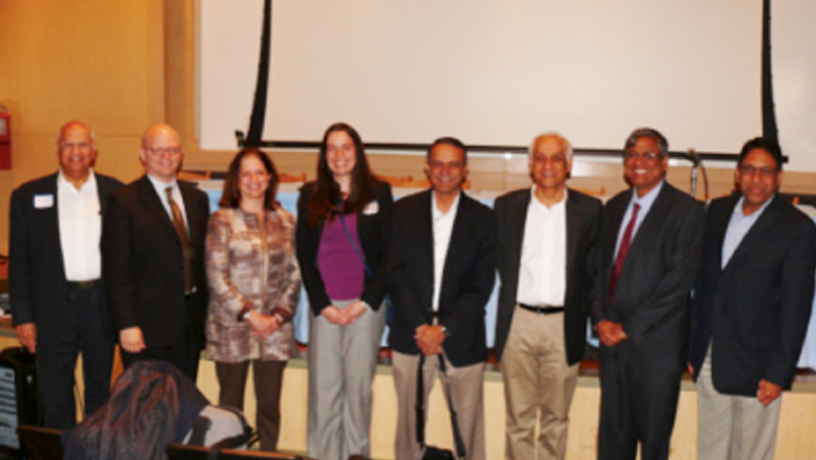SEAS Energy Day Underscores Innovative Ideas on Sustainable, Affordable Energy
Experts addressed issues of integrating high fractions of variable power into the grid and novel ideas for providing sustainable, affordable energy.
At a recent one-day symposium, leading experts and researchers in sustainable energy addressed the issues of integrating high fractions of variable power into the grid and novel ideas for providing sustainable, affordable energy resources.
The symposium, held May 8 in Davis Auditorium, was jointly sponsored by the Department of Mechanical Engineering and the IITB Heritage Foundation.
In his welcome remarks, Professor Jeffrey Sachs stated that now that world leaders have agreed on the lower carbon emission targets at the Paris COP 21 meeting, it is up to the engineers to come up with the required solutions to meet the de-carbonization goals while also meeting the energy needs of the poor as well as the rich in India and around the world.
Mechanical Engineering Professor Vijay Modi, an expert in the field of sustainable and affordable energy, presented the new technologies he is developing to make renewable and affordable energy available to those who are without energy access in poor and emerging markets in Africa and India. Modi also is a member of the Earth Institute and directs the Sustainable Engineering Lab at Columbia.
Distinguished speakers included Himadri Pakrasi of Washington University, who is Greensfelder Distinguished University Professor and director of the International Center for Advanced Renewable Energy and Sustainability, and Jacopo Buongiorno, professor and associate department head of nuclear science and engineering at MIT.
Pakrasi explained the key role of “engineering” biology to develop safe and efficient systems that borrow from nature to produce high-value products and eventually food and energy. Buongiorno discussed the role of nuclear power and the potential of small modular nuclear reactors. He emphasized the importance of scaling rapidly and that nuclear energy has already demonstrated the potential of scale. He also cautioned that Thorium for nuclear fuel cycles could be a distraction for the world when already proven Uranium-based cycles are available.
Deepak Divan of Georgia Tech talked about the coming advances in power systems and power electronics that could enable a transition towards integrating renewables into the power grid. He described some of the innovative edge-of-the-grid systems being tested to manage voltage stability. Divan is a professor and director of the Center for Distributed Energy at Georgia Tech.
In an afternoon session, Pramod Khargonekar, assistant director of engineering at the National Science Foundation and a 1977 IIT Bombay graduate, gave his perspectives on the evolution of electric energy systems in both developed and developing economies. He also described the role of engineering research and development in the process.
Guest speaker Audrey Zibelman, chair of the New York State Public Service Commission that is responsible for regulating the New York State electric utility industry, talked about the potential regulatory changes required to better incorporate renewable energy in the commercial power systems. She reflected that some transitions enabled through modern advances in communications could occur faster than one could have imagined in the past.
Silvia Romero and Nathan Blair described what the World Bank is doing to enable developing countries to accomplish the same transition.
In his closing remarks, Ruyintan Mehta, president of IIT Bombay Heritage Foundation, talked about an IITBHF initiative that highlights the work being done by IIT Bombay graduates and alumni in critical and important engineering, technology, and policy areas. D.C. Agrawal, president of the IIT Bombay AA GNY Chapter, thanked the speakers for their presentations and for shedding light on this important and potentially life-changing subject, and the many volunteers for making the symposium a success.

